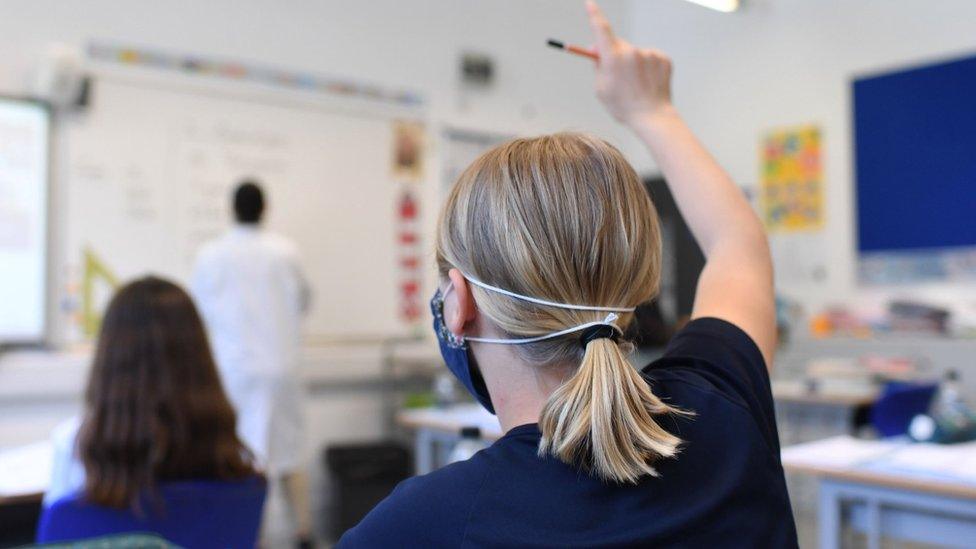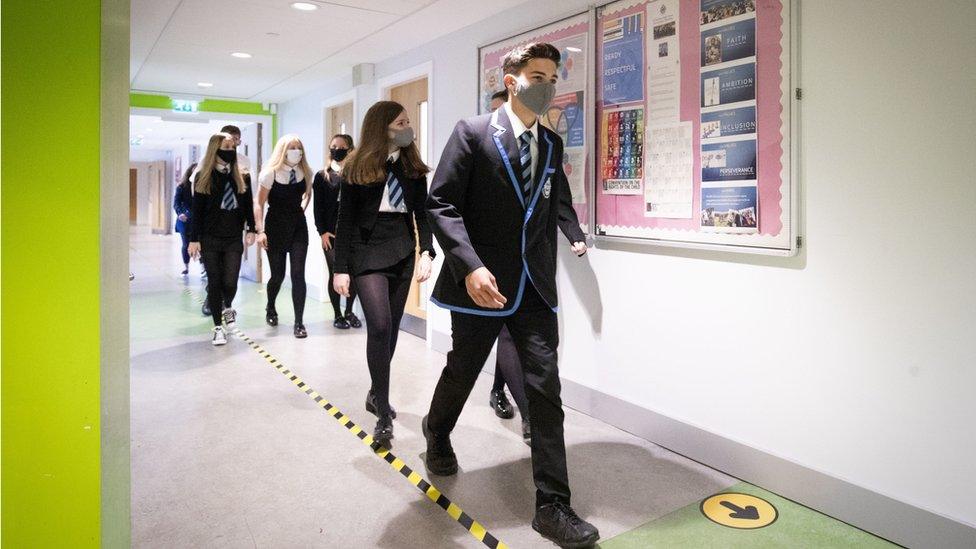Covid in Scotland: Teachers asked if they would strike
- Published

Teachers in Scotland are being asked if they would consider strike action over Covid school safety concerns.
The EIS teaching union is surveying members on the prospect of industrial action as Covid-related absences hit a new high.
Almost 30,000 pupils were off school last Tuesday, according to the latest provisional data, external.
First Minister Nicola Sturgeon said the government did not take lightly school safety issues.
But she told the daily coronavirus briefing she wanted to avoid closing schools for the good of children and young people.
Interim Chief Medical Officer Gregor Smith said teachers were no more likely to be infected than people of a similar age in other occupations.
Parents group Us For Them Scotland has urged minister to keep schools open.
Larry Flanagan, the general secretary of the EIS union, told BBC radio's Good Morning Scotland that members were being asked whether they would be "prepared to consider industrial action in terms of a safety strike protest".
It is understood this would involve balloting for strike action in individual schools or local authorities where there are higher rates of infection, and where teachers believe safety measures are insufficient.
The question is one of a series that is being put to union members in a survey which also asks about Covid measures in their schools and how safe they feel at work.
It comes as ministers consider moving parts of central Scotland to the highest level of coronavirus restrictions - level four - in the next few days. They have said schools will remain open.
Mr Flanagan said the Scottish government should consider the role of schools in their efforts to contain the virus.
He said there should be scope for blended learning - part-time education with physical distancing - or remote learning for a short period of time.

The latest Scottish government statistics show that Covid-related pupil absence levels hit 4.2% on 10 November, but only 758 of the 29,486 absent pupils had Covid-related sickness.
Absence levels are higher in secondary schools, where they stand at 5.3%, compared to 3.3% in primary schools.
Mr Flanagan said: "We're not saying schools are the main drivers, what we're saying is that schools are part of the spread of the virus and you only have to look in Glasgow at the moment where we have two secondary schools with nearly 400 pupils in each school who are having to isolate because they are either infected or a contact.
"If there was no evidence that pupil-to-pupil transmission takes place, why are there literally 30,000 pupils off school because of contacts?
"There clearly is a level of transmission within schools and those pupils who sit side-by-side most of the day then go back into their homes and their parents are part of the broader community.
"It's not that we're saying schools are super-spreaders, but equally they are part of the balance there about how to suppress the virus."


The Scottish government has prioritised keeping schools open full time.
They have spoken of their determination to avoid widespread school closures and the plans for level four restrictions set out a few weeks ago do not involve either automatically shutting schools or moving to part-time schooling - so-called blended learning.
Individual schools have, however, sometimes been closed because of specific concerns.
The government's determination to minimise disruption to education has been used as an argument for other difficult decisions and restrictions.
To change this policy would be politically very difficult. In June they faced an enormous backlash over plans for blended learning and were accused of an enormous U-turn when they announced an ambition to reopen schools full-time.
Schools were, however, told to keep plans for blended learning in reserve in case they were needed. One reason why next year's Higher and Advanced Higher exams will be later than usual is to allow for the risk of disruption.
Some within education would be concerned if schools were shut or moved to blended learning. They are well-aware of the risks to those pupils whose attainment may suffer and to those children for whom school is a safe space.
There is also the question of how parents might react if their children were only at school part-time.

Parents group Us For Them Scotland called for the government to keep schools open - even in level four areas.
"We know there are influential groups who've wanted schools shut right from the start, and now strike action is being used as another tactic to force this through," organiser Jo Bisset said.
"All of this serves to damage the wellbeing and prospects of children. Schools are and should be considered critical infrastructure."
At her daily briefing, Nicola Sturgeon said she was asking adults to follow more restrictions so the virus can be kept to a level where schools can remain open.
"Young people have had months out of school already this year and if we can at all avoid it, we want to ensure that they don't have further time out of normal full-time schooling."
Gregor Smith, the interim chief medical officer, said there was "no compelling evidence of significant transmission" of Covid between young pupils, and transmission in older pupils was generally lower than in adults.
He said they would continue to monitor the data.

